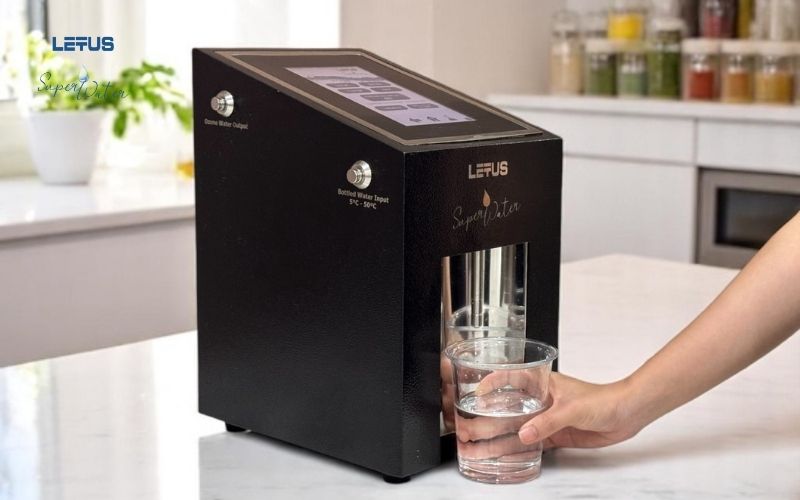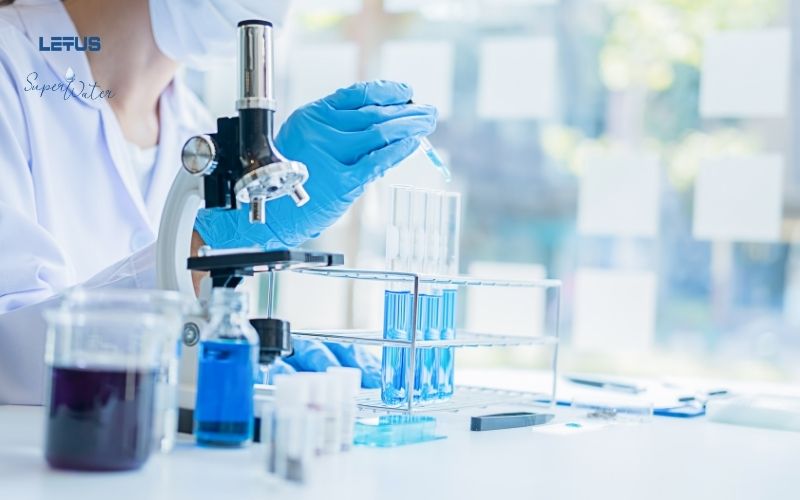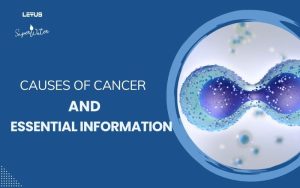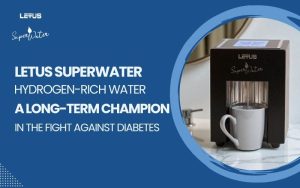1. How Hydrogen-Rich Water Supports Cancer Treatment

Hydrogen water has long been studied and applied effectively in supporting the treatment of various diseases, including cancer. Products like the Letus SuperWater Pouch or the Letus SuperWater Machine are beneficial due to their high Hydrogen concentration and optimized alkalinity, which are claimed to support disease management.
To achieve its potential therapeutic effects, Letus SuperWater utilizes Hydro Thermal Electrolysis (HTE) technology to produce high-concentration Hydrogen water. This technology electrolyzes the water, separating and largely removing Oxygen to one pole for discharge, leaving the remaining water rich in Hydrogen.
The Letus SuperWater machine allows users to adjust both the Hydrogen concentration and the water’s alkalinity via a modern touchscreen interface. Furthermore, the separated, Oxygen-rich water discharged from a separate outlet is Ozone water, which possesses mild antibacterial properties and can be used for hand washing or cleaning produce.
The Hydrogen water from Letus SuperWater is claimed to perform three crucial tasks in supporting cancer treatment: protecting healthy cells, limiting the formation of new cancer cells, and reducing the number of existing cancer cells.
2. Scientific Evidence: Molecular Hydrogen Support for Cancer

2.1 Protective Effect of Hydrogen Gas Inhalation on Radiation-Induced Bone Marrow Injury in Cancer Patients
Authors: Hirano, Shin-ichi, et al.
Year: 2021
2.2 Protective Effect of Hydrogen-Rich Water on Liver Function in Colorectal Cancer Patients Treated with Chemotherapy
The study found that hydrogen-rich water was capable of minimizing liver injury caused by mFOLFOX6 chemotherapy (a combination of various chemotherapeutic agents) in colorectal cancer patients.
- Study Title: Protective effect of hydrogen-rich water on liver function of colorectal cancer patients treated with mFOLFOX6 chemotherapy.
- Authors: Qing Xi, et al.
- Publication Date: September 1, 2017
2.3 Mechanism of Hydrogen-Rich Water in Cancer Support
This research provided preliminary evidence that hydrogen gas is effective in reducing the proportion of T PD-1+ CD8+ cells and improving the prognosis (e.g., prolonging survival, reducing symptoms, enhancing quality of life, and increasing survival rate) of patients with advanced colorectal cancer.
- Study Title: Immunological effect of hydrogen gas—Hydrogen gas improves clinical outcome of cancer patients.
- Authors: Akagi J.
- Publication: Gan to Kagaku ryoho. Cancer & Chemotherapy, October 1, 2018
2.4 Effect of Drinking Hydrogen-Rich Water on Quality of Life in Patients Treated with Radiation Therapy for Liver Cancer
Daily consumption of Hydrogen-rich water may be an effective supportive method during radiation therapy for cancer patients. Hydrogen-rich water improved the quality of life (QOL) by reducing oxidative stress caused by radiation, without affecting the efficacy of the cancer treatment.
- Study Title: Effect of drinking hydrogen-rich water on the quality of life of patients treated with radiotherapy for liver tumors.
- Authors: Ki-Mun Kang, et al.
- Year: 2011
2.5 Anti-Tumor Activity of Molecular Hydrogen and Protons in the Treatment of Malignant Brain Tumors
The study Antitumor activity of molecular hydrogen and proton in the treatment of malignant brain tumors: An unusual pharmacology by Luc Rochette, et al., found that both H2 and H+ inhibited the proliferation, invasion, and metastasis of malignant brain tumor cells. They were shown to reduce the expression of genes associated with cancer cell proliferation and invasion (such as Cyclin D, MMP-9 and VEGF and activate anti-cancer signaling pathways (such as the NF-κB and p53 signaling pathways).
The evidence supporting Letus SuperWater is based on high Hydrogen concentrations, verified through numerous scientific studies, and is being widely applied.
3. Mechanism of Hydrogen-Rich Water in Cancer Support

Cancer is an extremely dangerous disease requiring guidance and thorough treatment from specialized physicians. Thanks to Hydro Thermal Electrolysis technology, Letus SuperWater produces high-concentration Hydrogen water that is claimed to support the cancer treatment process and reduce the side effects of chemotherapy and radiation therapy by:
- Cellular Protection: Hydrogen selectively seeks out and neutralizes free radicals, helping to protect healthy cells from damage, prevent genetic mutation, and limit the formation of cancer cells.
- Inhibiting Growth: Hydrogen is claimed to inhibit the growth of cancer cells and stimulate their rapid cell death (apoptosis), thereby helping to reduce tumor size.
- Preventing Metastasis: Hydrogen also helps inhibit the formation of new blood vessels (angiogenesis), which prevents the development and metastasis of cancer.
4. Letus SuperWater Mitigation of Chemotherapy and Radiation Therapy Side Effects
In addition to the evidence supporting its role in cancer, the Hydrogen in Letus SuperWater is also claimed to reduce the side effects of chemotherapy and radiation therapy.
Letus SuperWater is suggested to enhance the overall health of patients undergoing chemotherapy and radiation therapy during cancer treatment by:
- Neutralizing Toxins: Neutralizing free radicals generated during chemotherapy and radiation, which reduces inflammation, swelling, pain, and discomfort.
- Organ and Immune Support: Protecting and improving liver function, strengthening the immune system to help the body fight infection, and supporting earlier health recovery.
- Unique Antioxidant Use: Hydrogen is currently the only antioxidant that can be used during chemotherapy and radiation therapy. Due to its very small size, Hydrogen can pass through the cell membrane and mitochondrial membrane to support healthy cells.

In conclusion, the emerging body of research provides strong and compelling arguments summarized as Scientific Evidence: Molecular Hydrogen Support for Cancer. While not a standalone cure, the unique properties of Molecular Hydrogen—namely its selective antioxidant action, superior cellular penetration, and capacity to support vital organ functions—demonstrate a significant potential to mitigate the harsh side effects of standard treatments like chemotherapy and radiation. Furthermore, studies suggesting its role in protecting healthy cells, inhibiting tumor growth, and preventing metastasis underscore its value as a powerful adjuvant therapy. Ultimately, the integration of high-concentration hydrogen water, such as Letus SuperWater, offers a promising path to enhance overall patient well-being and quality of life during and after rigorous cancer treatment protocols.



